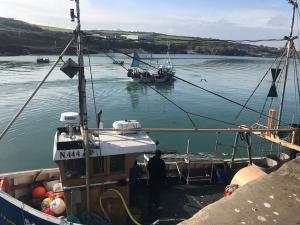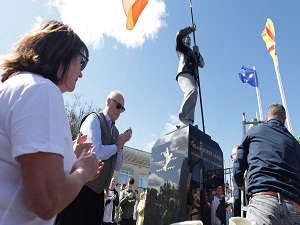
By Aoife Moore, Press Association
Two fishermen have been reunited with their boats amid an ongoing impasse over fishing rights.
Jack Brown, 57, and 47-year-old Kevin Trainor pleaded guilty to breaching fishing regulations on Friday after their trawlers were seized in Dundalk Bay.
The Northern Ireland-registered vessels were seized by the Irish navy on Tuesday amid an ongoing dispute over their right to fish in Ireland's waters.
Judge John Coughlan told Co Louth District Court that the men were people of absolute integrity, but he was bound by a Supreme Court decision which effectively banned Northern Ireland boats from fishing in Irish inshore waters.
The judge asked at one point if he could strike out the charges.
"It's clear these are people of absolute integrity, and I should be as lenient as possible," he said.
"This should be dealt with with absolute discretion, but I am bound by the Supreme Court.
"My instinct is to strike out the charge, but can I legally do that?"
Solicitor for the two men Karina Kinsella said that not being able to access their boats was "affecting them greatly" and that it was "unfortunate that Northern Irish fisherman are missing out" because of the Supreme Court ruling.
Judge Coughlan agreed, and added that he did not feel the men deserved any conviction.
They were given the benefit of the Probation Act and the boats were released early on Friday afternoon and returned to Kilkeel, Co Down, where they are usually based.
Both men left court after the judgement and travelled to Clogherhead Harbour where the boats had been kept.
The boats seized, Boy Joseph and Amity, were described as modest vessels, with a total of five staff between them.
The Boy Joseph had just over 1,200 euro worth of shellfish on board when it was seized.
Amity had a haul of crabs and lobsters worth an estimated 2,000 euro.
Both men have no previous convictions and fully co-operated with Irish police.
The move by Irish authorities comes amid an ongoing fishing dispute caused by the demise of an informal deal between the UK and Irish Governments.
The DUP representative for the Kilkeel area, Jim Wells, said the Irish navy had been heavy-handed in their actions.
"The men weren't doing anything illegal, it was a gentleman's agreement which is being contested in the courts," he said.
"There is no need for a gunboat to arrive that had the power to take out both boats with one shot.
"That is not required for two little fishing boats from Kilkeel who were carrying nothing more dangerous than a fax machine.
"People in the community cannot understand how two little trawlers fishing for crabs started a diplomatic incident.
"All that was required was a chat with the two skippers, not something that could've blown them to smithereens if they wanted to.
"It's like something Arnold Schwarzenegger would have."
The Voisinage agreement, which collapsed months after the Brexit referendum, was a reciprocal understanding between the UK and Irish Republic dating back to the mid-1960s which allowed vessels from Northern Ireland to fish in Irish inshore waters (zero to six nautical miles from shore) and vice versa.
But the agreement hit the rocks in late 2016 when a number of Irish fishermen took a case to the state's Supreme Court, challenging the right of Northern Ireland vessels to fish in their waters.
The court ruled that Voisinage was an informal agreement of insufficient legal standing to formally grant access to foreign-registered boats.
That decision effectively banned Northern Ireland boats from fishing in Irish inshore waters - a move which affected fishermen north of the border who traded in species such as lobsters, crabs, mussels and whelks.
The UK has continued to recognise the Voisinage agreement so Irish vessels remain free to fish inshore waters around Northern Ireland.


 Council says it did not receive a planning application for Bobby Sands statue
Council says it did not receive a planning application for Bobby Sands statue
 Woman escapes injury following arson attack in Derry/Londonderry
Woman escapes injury following arson attack in Derry/Londonderry
 Motorcyclist in critical condition following collision with van
Motorcyclist in critical condition following collision with van
 Court of Appeal affirms ruling on public inquiry in Sean Brown case
Court of Appeal affirms ruling on public inquiry in Sean Brown case
 Victims urge boycott of new Troubles legacy body during protest at its office
Victims urge boycott of new Troubles legacy body during protest at its office